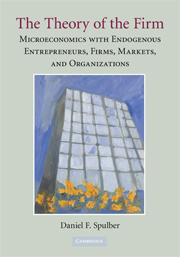 The Theory of the Firm
The Theory of the Firm Book contents
- Frontmatter
- Contents
- Preface and Acknowledgments
- Introduction
- PART I THE THEORY OF THE FIRM
- PART II THE ENTREPRENEUR IN EQUILIBRIUM
- PART III HUMAN CAPITAL, FINANCIAL CAPITAL, AND THE ORGANIZATION OF THE FIRM
- PART IV INTERMEDIATION BY THE FIRM
- 8 The Firm as Intermediary in the Pure-Exchange Economy
- 9 The Firm versus Free Riding
- PART V MARKET MAKING BY THE FIRM
- 12 Conclusion
- References
- Author Index
- Subject Index
9 - The Firm versus Free Riding
Published online by Cambridge University Press: 05 June 2012
- Frontmatter
- Contents
- Preface and Acknowledgments
- Introduction
- PART I THE THEORY OF THE FIRM
- PART II THE ENTREPRENEUR IN EQUILIBRIUM
- PART III HUMAN CAPITAL, FINANCIAL CAPITAL, AND THE ORGANIZATION OF THE FIRM
- PART IV INTERMEDIATION BY THE FIRM
- 8 The Firm as Intermediary in the Pure-Exchange Economy
- 9 The Firm versus Free Riding
- PART V MARKET MAKING BY THE FIRM
- 12 Conclusion
- References
- Author Index
- Subject Index
Summary
The critical issue in the theory of the firm is determining what firms can do for consumers that consumers cannot do for themselves. Firms play an economic role when they increase efficiency in comparison to direct exchange between consumers. Consumers form organizations to take advantage of the benefits of joint production. The gains from joint production include economies of scale, public goods, common property resources, and externalities. However, consumer organizations can experience inefficiencies due to free riding. By separating the objectives of the organization from the consumption objectives of its owners, the firm addresses the free rider problem.
The chapter examines three types of gains from joint production: economies of scale, public goods, and extraction of common-property resources. Consumers can take advantage of the gains from joint production by forming a consumer organization. The consumer organization is a basic partnership, which can take the form of a buyers' cooperative, a workers' cooperative, a club, an association, or a syndicate. The consumer organization not only allocates goods, but also allocates total costs, so that its budget balances. Due to the budget-balancing constraint, the consumer organization experiences inefficiencies due to free riding. The purpose of the chapter is to examine how firms can improve the efficiency of the organization engaged in joint production.
- Type
- Chapter
- Information
- The Theory of the FirmMicroeconomics with Endogenous Entrepreneurs, Firms, Markets, and Organizations, pp. 329 - 364Publisher: Cambridge University PressPrint publication year: 2009


